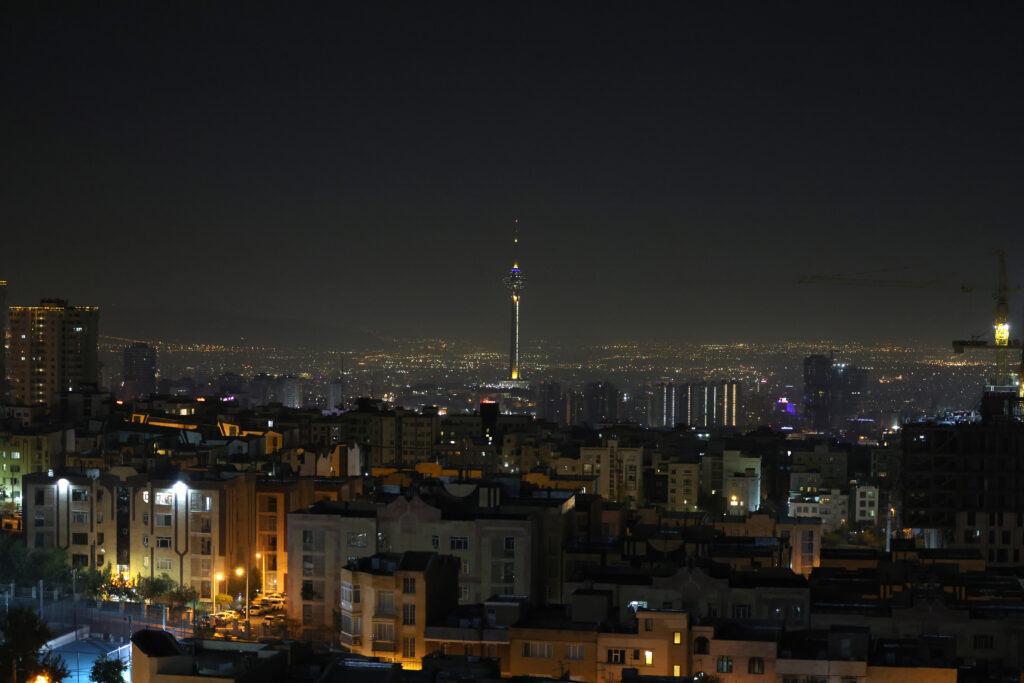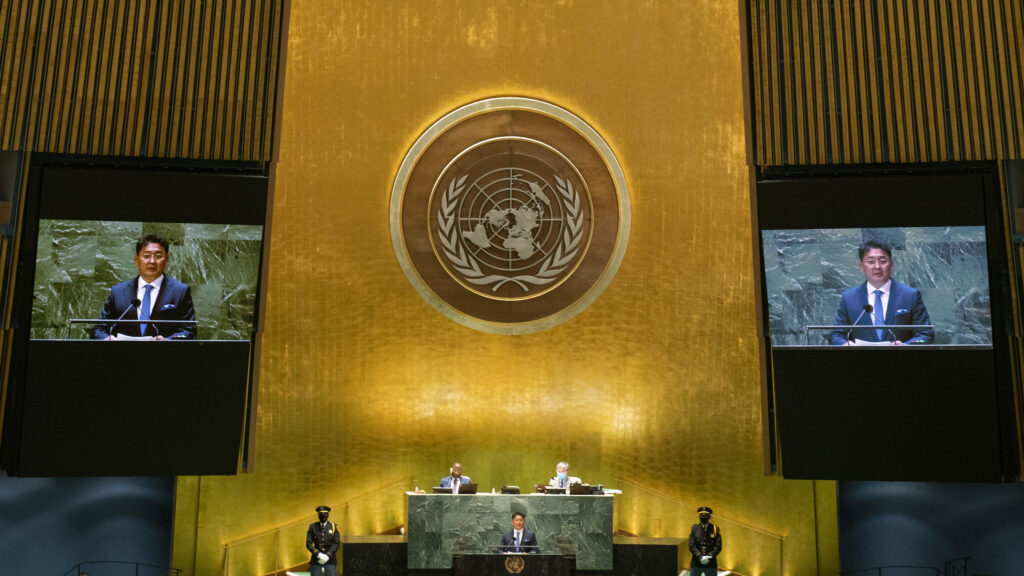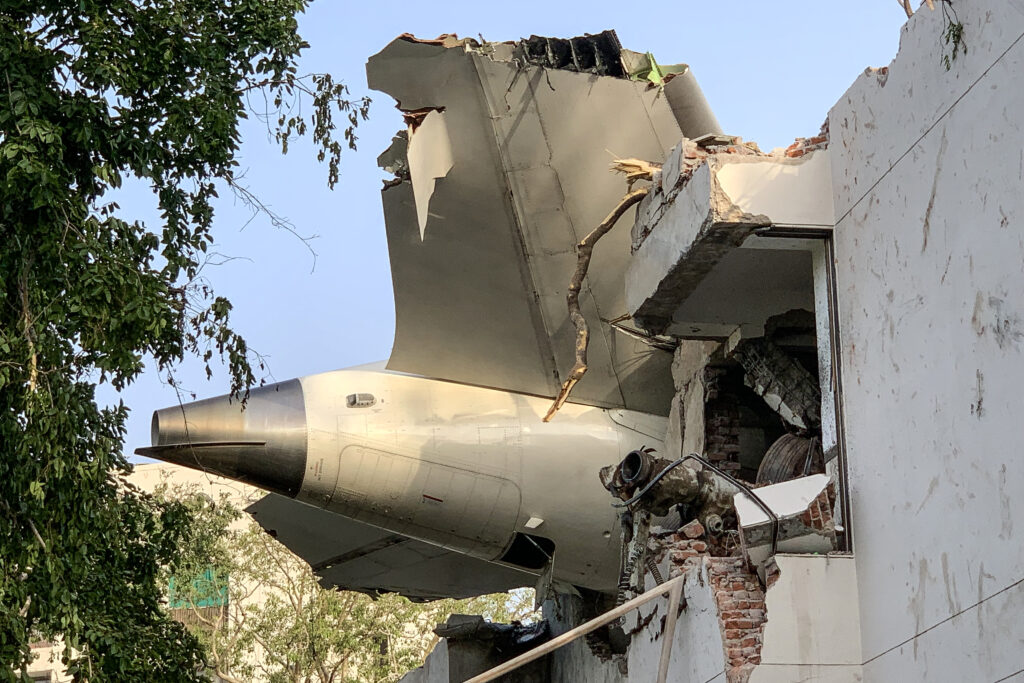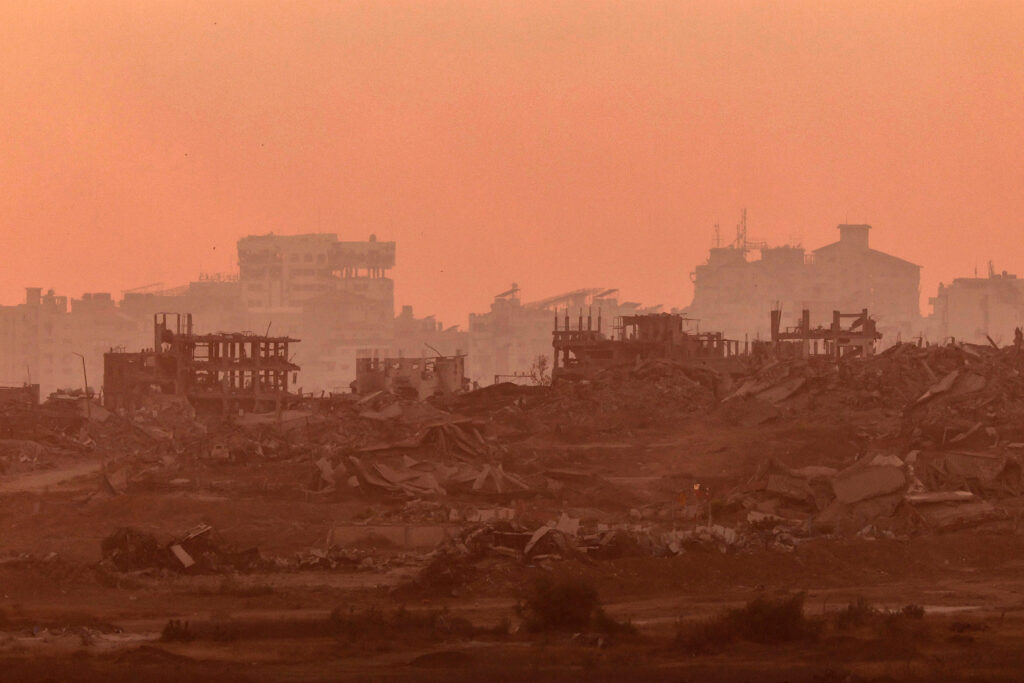AFP Asia Business
Israel launches ‘preemptive’ strikes on Iran
Israel carried out “preemptive” strikes against Iran on Friday, targeting its nuclear plant and military sites, after US President Donald Trump warned of a possible “massive conflict” in the region. Explosions were heard Friday morning in the Iranian capital, state TV reported, adding that Iran’s air defence were at “100 percent operational capacity”.Israel declared a state of emergency, with Defence Minister Israel Katz saying that retaliatory action from Tehran was possible following the operation.”Following the State of Israel’s preemptive strike against Iran, a missile and drone attack against the State of Israel and its civilian population is expected in the immediate future,” Katz said.Oil prices surged as much as 6 percent on the strikes, which came after Trump warned of a possible Iranian attack and said the US was drawing down staff in the region.”I don’t want to say imminent, but it looks like it’s something that could very well happen,” Trump told reporters at the White House Thursday when asked if an Israeli attack loomed. Trump said he believed a “pretty good” deal on Iran’s nuclear programme was “fairly close”, but said that an Israeli attack on its arch foe could wreck the chances of an agreement.The US leader did not disclose the details of a conversation on Monday with Israeli Prime Minister Benjamin Netanyahu, but said: “I don’t want them going in, because I think it would blow it.”Trump quickly added: “Might help it actually, but it also could blow it.”A US official said there had been no US involvement in the Israeli strikes on Iran.– ‘Extremist’ –The United States on Wednesday said it was reducing embassy staff in Iraq — long a zone of proxy conflict with Iran.Israel, which counts on US military and diplomatic support, sees the cleric-run state in Tehran as an existential threat and hit Iranian air defences last year.Netanyahu has vowed less restraint since the unprecedented October 7, 2023 attack on Israel by Tehran-backed Hamas, which triggered the massive Israeli offensive in Gaza.The United States and other Western countries, along with Israel, have repeatedly accused Iran of seeking a nuclear weapon, which it has repeatedly denied.Israel again called for global action after the UN’s International Atomic Energy Agency (IAEA) accused Iran on Wednesday of non-compliance with its obligations. The resolution could lay the groundwork for European countries to invoke a “snapback” mechanism, which expires in October, that would reinstate UN sanctions eased under a 2015 nuclear deal negotiated by then US president Barack Obama.Trump pulled out of the deal in his first term and slapped Iran with sweeping sanctions.Iran’s nuclear chief, Mohammad Eslami, slammed the resolution as “extremist” and blamed Israeli influence.In response to the resolution, Iran said it would launch a new enrichment centre in a secure location.Iran would also replace “all of these first-generation machines with sixth-generation advanced machines” at the Fordo uranium enrichment plant, said Behrouz Kamalvandi, spokesman of the Atomic Energy Organization of Iran.Iran currently enriches uranium to 60 percent, far above the 3.67-percent limit set in the 2015 deal and close, though still short, of the 90 percent needed for a nuclear warhead.
UN General Assembly calls for Gaza ceasefire, pressure on Israel
The UN General Assembly on Thursday adopted a resolution demanding an immediate ceasefire in Gaza and urging nations to take “all measures necessary” to place pressure on Israel.Following the United States’ veto of a similar push in the Security Council last week, the General Assembly adopted the non-binding resolution by a vote of 149-12, with 19 abstentions.The text demands “an immediate, unconditional and permanent ceasefire” in Gaza, as well as “the immediate and unconditional release of all hostages” seized during the unprecedented Hamas attack inside Israel on October 7, 2023 that sparked the war.However it goes further than the US-vetoed text, taking direct aim at Israel over its impeding aid deliveries into the Gaza Strip.It “demands that Israel, the occupying Power, immediately end the blockade… and ensure that aid reaches the Palestinian civilian population throughout the Gaza Strip,” which after more than 20 months of war is facing a catastrophic humanitarian situation.It also calls on all UN members to “individually and collectively take all measures necessary, in line with international law… to ensure compliance by Israel with its obligations.”Israel’s envoy Danny Danon slammed the resolution in remarks to the press ahead of the vote, saying it is “a farce, is a moral failure, is a political stunt.”Palestinian Ambassador Riyad Mansour meanwhile called on all nations to turn their votes “into resolute action.””No arms, no money, no trade to oppress Palestinians,” he urged.- ‘Accountability’ -Israel is facing mounting pressure to allow more humanitarian aid into Gaza, where the entire population is at risk of famine, according to the UN.The resolution adopted on Thursday “strongly (condemns) any use of starvation of civilians as a method of warfare and the unlawful denial of humanitarian access.”Israel recently ended a total blockade to allow some deliveries to resume through the newly formed, US-backed Gaza Humanitarian Foundation (GHF) distribution centers.The United Nations, which until now has sought to coordinate aid deliveries throughout Gaza, refuses to work with the GHF, citing concerns over its practices and neutrality.Dozens of people have been killed near GHF distribution points since late May, according to Gaza’s civil defense agency. It said Israeli forces killed another 21 people waiting for aid on Thursday.GHF meanwhile blamed the Palestinian militant group Hamas for the deaths of at least eight of its staff in Gaza late Wednesday.- ‘Mad march’ -In the absence of Security Council action, Mansour had called last week for all countries to take “immediate and real measures” to force Israel “to stop the mad march it is embarked on.”With the vote taking place just days before an international conference at the UN on the Palestinian issue, the text also reiterates the Assembly’s “unwavering commitment to the two-State solution… where two democratic States, Israel and Palestine, live side by side in peace and security.”It was a UN General Assembly resolution in 1947 that divided British-ruled Palestine into two states — one Arab and one Jewish. But only the creation of Israel was proclaimed on May 14, 1948. This triggered a war between Israel and its Arab neighbors.Over the decades, the UN body has expressed its strong support for the Palestinians in the face of the continuing Israeli occupation.Israel has meanwhile relied on strong support from its veto-holding US ally, which has only deepened under President Donald Trump.The resolution “does nothing to free the hostages, improve the lives of civilians in Gaza or bring us closer to a ceasefire,” US acting ambassador Dorothy Shea told the Assembly.Instead, she charged it was “yet another performative action that erodes the credibility of this body.”
At least 265 dead in India plane crash, one passenger survives
A London-bound passenger jet crashed in a residential area in the Indian city of Ahmedabad on Thursday, killing at least 265 people on board and on the ground — but one passenger has miraculously survived.An AFP journalist saw bodies being recovered from the crash site, and the back of the Boeing 787-8 Dreamliner — which …
At least 265 dead in India plane crash, one passenger survives Read More »
Trump warns Israeli attack on Iran ‘could very well happen’
President Donald Trump warned Thursday that Israel may soon strike Iran’s nuclear sites, but urged the key US ally to hold off as he stressed his commitment to a diplomatic solution.Tensions have soared in the region in the last two days with Trump warning of a “massive conflict” and drawing down US staff. Tehran meanwhile defiantly vowed to increase its output of enriched uranium — a key sticking point in talks with Washington — after being censured by the UN’s atomic watchdog.”I don’t want to say imminent, but it looks like it’s something that could very well happen,” Trump told reporters at the White House when asked if an Israeli attack loomed.Trump said he believed a “pretty good” deal on Iran’s nuclear program was “fairly close,” but said that an Israeli attack on its arch-foe could wreck the chances of an agreement.The US leader did not disclose the details of a conversation on Monday with Israeli Prime Minister Benjamin Netanyahu, but said: “I don’t want them going in, because I think it would blow it.”Trump quickly added: “Might help it actually, but it also could blow it.”News outlet Axios reported that Trump had said the United States would not participate in any strikes.- US troops in crosshairs -Trump later appeared to want tensions dialed down in a post on social media, while insisting that Iran must “give up hopes” of developing a nuclear weapon.”We remain committed to a Diplomatic Resolution to the Iran Nuclear Issue! My entire Administration has been directed to negotiate with Iran,” Trump said on his Truth Social network.Tensions have rapidly escalated in the past few days amid growing speculation that Israel could push ahead with air strikes on Iran.Trump’s Middle East pointman Steve Witkoff is set to hold a sixth round of talks with Iran on Sunday in Oman, which has mediated efforts towards a nuclear deal so far.But Iran has also ramped up rhetorical pressure before the talks, including with a threat to strike American bases in the region if the negotiations break down and conflict erupts.”If the talks fail, the risk of military escalation becomes much more immediate,” said Hamidreza Azizi, a visiting fellow at the German Institute for International and Security Affairs.The United States on Wednesday said it was reducing embassy staff in Iraq — long a zone of proxy conflict with Iran.Israel, which counts on US military and diplomatic support, sees the cleric-run state in Tehran as an existential threat and hit Iranian air defenses last year.Netanyahu has vowed less restraint since the unprecedented October 7, 2023 attack on Israel by Tehran-backed Hamas, which triggered the massive Israeli offensive in Gaza.- ‘Non-compliance’ -The United States and other Western countries, along with Israel, have repeatedly accused Iran of seeking a nuclear weapon, which it has repeatedly denied.Israel again called for global action after the UN’s International Atomic Energy Agency (IAEA) accused Iran on Wednesday of non-compliance with its obligations. The resolution could lay the groundwork for European countries to invoke a “snapback” mechanism, which expires in October, that would reinstate UN sanctions eased under a 2015 nuclear deal negotiated by then US president Barack Obama.Trump pulled out of the deal in his first term and slapped Iran with sweeping sanctions.Iran’s nuclear chief, Mohammad Eslami, slammed the resolution as “extremist” and blamed Israeli influence.In response to the resolution, Iran said it would launch a new enrichment center in a secure location.Iran would also replace “all of these first-generation machines with sixth-generation advanced machines” at the Fordo uranium enrichment plant, said Behrouz Kamalvandi, spokesman of the Atomic Energy Organization of Iran.Iran currently enriches uranium to 60 percent, far above the 3.67-percent limit set in the 2015 deal and close, though still short, of the 90 percent needed for a nuclear warhead.
Israel says Hamas ‘weaponising suffering in Gaza’ as aid workers killed
Israel charged on Thursday that Hamas was “weaponising suffering in Gaza” after a US and Israeli-backed charity accused the Palestinian militant group of killing eight of its aid workers in the territory.The distribution of food and basic supplies in the blockaded and war-ravaged Gaza has become increasingly fraught and perilous, exacerbating the territory’s deep hunger crisis.The Gaza Humanitarian Foundation said a bus carrying its staff to a distribution site near the southern city of Khan Yunis was “brutally attacked by Hamas” around 10:00 pm (1900 GMT) on Wednesday.The GHF said: “As of now, we can confirm at least eight fatalities, multiple injuries, and we fear that some of our team members have been taken hostage.”Israel’s foreign ministry said “Hamas is weaponising suffering in Gaza — denying food, targeting lifesavers and forsaking its own people”.Asked to respond to the GHF accusation, the Hamas government media office in Gaza said GHF was a “filthy tool” of Israeli forces and was being used to “lure civilians into death traps”.It did not comment on the GHF’s accusation.Dozens of Palestinians have been killed while trying to reach GHF distribution points since they began operating in late May, according to Gaza’s civil defence agency.The agency said another 21 people were killed while waiting for aid on Thursday, adding that they were among 29 people across the territory who were killed by Israeli fire.Contacted by AFP about reports of a deadly incident near an aid distribution point close to the Netzarim corridor in central Gaza, the Israeli military said it had “conducted warning shots hundreds of metres from the aid distribution site, prior to its opening hours.”Israeli restrictions on media in Gaza and the difficulties of access on the ground mean AFP is unable to independently verify the casualty tolls provided by the civil defence agency or the deaths reported by the GHF.- ‘Died while waiting’ -An officially private effort with opaque funding, the GHF began operating on May 26 after Israel cut off supplies into Gaza for more than two months, sparking international condemnation and warnings of imminent famine.During its first week of operations, the GHF said it distributed more than seven million meals’ worth of food, but its operations were widely criticised even before the deadly shootings near its sites.The United Nations and major aid groups have refused to work with the GHF, citing concerns over its practices and neutrality.Gaza medics have said hospitals are being inundated with people wounded while trying to obtain food.At Gaza City’s Al-Shifa Hospital on Wednesday, the emergency department said it had received dozens of people who had been killed or wounded while waiting for aid in recent days, including 200 in a single day.”Many Gazans went to the Nabulsi and Netzarim areas to receive aid and were shot at and shelled with tanks,” said Mutaz Harara, head of Al-Shifa’s emergency department.But with few medical supplies and no operating theatres, “many patients died while waiting for their turn”, he said.The war has caused major damage to infrastructure across Gaza, including water mains, telecommunication cables, power lines and roads.The Palestinian Authority said internet and fixed-line communication services were down in Gaza on Thursday following an attack on the territory’s last fibre optic cable which it blamed on Israel.- Aid workers deported -Meanwhile, Israel’s foreign ministry said six people detained aboard a boat attempting to breach Israel’s Gaza blockade were put on a plane for deportation on Thursday afternoon.They included European parliamentarian Rima Hassan, it said.”Bye-bye — and don’t forget to take a selfie before you leave,” the ministry wrote on X.The UN General Assembly on Thursday adopted 149-12 with 19 abstentions a non-binding resolution calling for an immediate ceasefire in Gaza and urging “all necessary measures” to pressure Israel into ending the conflict. The US vetoed a similar push at the Security Council last week.Egyptian authorities meanwhile detained more than 200 pro-Palestinian activists in Cairo ahead of a planned march to the Gaza border, the organisers said.Egypt said while it backs efforts to put “pressure on Israel” to lift its Gaza blockade, any foreign delegations seeking to visit the border area must obtain prior approval.The Gaza war was sparked by Hamas’s October 7, 2023, attack on Israel.Israel said late on Wednesday that its forces had retrieved the bodies of two hostages from southern Gaza.Prior to the latest announcement, out of 251 taken hostage during the Hamas attack, 54 were still held in Gaza, including 32 the Israeli military has said are dead.Hamas’s assault resulted in the deaths of 1,219 people on the Israeli side, mostly civilians, according to an AFP tally of official figures.The health ministry in Hamas-run Gaza says Israel’s retaliatory offensive has killed at least 55,207 people, the majority of them civilians. The United Nations considers the figures reliable.bur-acc-jd-lba/dv/gv
Dollar dives on Trump’s new trade threat
The dollar plunged on Thursday after US President Donald Trump threatened higher unilateral tariffs on trade partners, and oil see-sawed as traders evaluated the probability behind reports that Israel could be gearing up to strike Iran.Stocks traded mixed as investors navigated the double whammy of returning trade uncertainty and geopolitical volatility, while Boeing’s share price …






